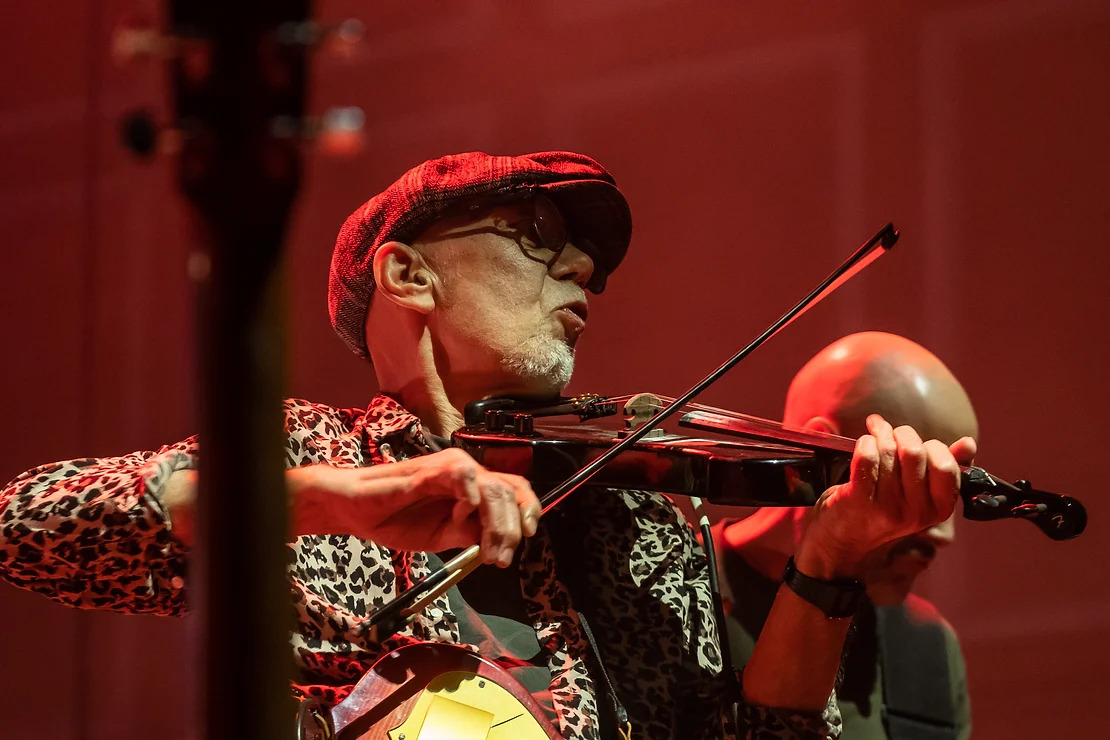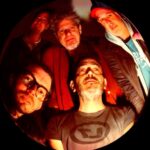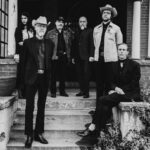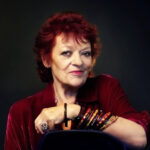
Rod Clements of Lindisfarne (Photo credit Jason Warnes)
Rod Clements of Lindisfarne speaks to Jason Barnard about their imminent Magic In The Air UK tour, new Radio Times – Live At The BBC 1971-1990 box set and Lindisfarne’s enduring appeal.
The Magic In The Air tour is coming up soon. How do you feel about being back on the road and performing for fans again?
Delighted and looking forward to it. Lindisfarne is very much about performing live to live audiences and it’s a two-way process. Since lockdown ended, we’ve noticed an elevation in audiences’ responses which in turn heightens the band’s performance. I think we’re all pleased and relieved to be let out again and that sensation persists even after eighteen months. It’s as if everybody – the band and the audiences – have emerged from an enforced hibernation with a greater appreciation of what live performance is all about.
With such an extensive back catalogue, how do you go about choosing which songs to play during your live shows?
We have about half a dozen songs that we always play (the obvious ones), which is no hardship because they all allow a bit of latitude for improvisation and interaction with the audience, which is different every gig. The rest of the set is picked from a huge back catalogue of songs, some of which have stood the test of time better than others, and we choose them on the basis of enjoyability (both to us and to audiences), and building a set list with a dynamic shape to include rockers and quieter, more reflective material. Fortunately most of the songs were written to be easily accessible on first hearing, and people often say to us that they recognised songs but hadn’t realised they were ours – even the less obvious ones.
https://www.youtube.com/watch?v=gNdeB-lSURU
You’ve mentioned that you enjoy dusting off old songs and bringing them back to life. Are there any particular songs that you’re excited to reintroduce to your set list?
We’re doing ‘Statues And Liberties’, the title track from Alan Hull’s last album (1995), a very powerful, politically motivated song which is as relevant today as it was then, and is a great number to play.
Radio Times – Live At The BBC 1971-1990 is coming out soon. How did the idea for this release come about, and what can fans expect from it?
The idea came from a long-standing contact of ours, a writer, archivist & musician called Colin Harper (who incidentally wrote the excellent Bert Jansch biography ‘Dazzling Stranger’). He’s curated several compilations of archive material for other artists, and he pitched the idea of a Lindisfarne collection to Repertoire, who went for it. From what I’ve heard, it’s a time-capsule of several iterations of the band. I particularly enjoyed hearing the early stuff again, including some blues left over from the Downtown Faction and some wacky versions of seldom-heard songs.
How did playing for the BBC compare with studio work?
It was a half-way house between playing live and “proper” studio recording. We had three-hour sessions to record maybe three or four songs, with limited opportunities for retakes or overdubs, so we had to work quickly and not get too hung up on details. The producers (especially John Walters) and engineers were well into this, and we had freedom to try out pretty much anything we liked – old songs, alternative versions etc. Happy days indeed.
Your music often features proud references to the North-East of England. How do you feel your roots have influenced your music and your career as a musician?
We up here in the far North-East have (fortunately) long been immune to the vagaries of fashion that affect musical trends in London. Apart from the usual 60s rock & pop influences that everyone shared, we absorbed the music of the Tyneside folk clubs. There’s a strong tradition of narrative songs with strong choruses up here (‘Blaydon Races’ is the obvious example) but we also have a lot of people of Irish descent, and we heard their songs – again, narrative with easy choruses, great melodies and a certain undercurrent of melancholy. Consciously and unconsciously, we absorbed all that (along with blues and the contemporary rock & pop records we liked), and Alan, particularly, created his own style out of that with songs like ‘We Can Swing Together’ and ‘Fog On The Tyne’.
Lindisfarne has been active for more than five decades now. What do you think has been the key to the band’s longevity and enduring popularity?
Well, we’re different. I can honestly say that there is no other band like us. From the above influences, and our unusual instrumentation, we accidentally stumbled on a style which remains unique to ourselves. Over 50 years there have obviously been ups and downs in the band’s fortunes, and the downs have usually come about when we succumbed to outside pressures to fit in with current trends, and deviated from that style. Now we are totally comfortable with it – in fact we revel in it.
Are there any songs in Lindisfarne’s catalogue that you feel are particularly underrated or overlooked?
Excuse me while I resort to Wikipedia to see what I might have forgotten about…. (10 minutes later) well, not many, actually. Over the last 8 years of this lineup’s existence, I think we’ve done most of what we want to do, but we circulate them. ‘Wake Up Little Sister’, from ‘Dingly Dell’, is one of my favourite Alan songs, deceptively simple but so romantic (I remember when he wrote it). It should have been the first single from that album – in fact, Slade told us that they were hoping that we wouldn’t release it, as it would have kept them off the No. 1 slot! We did it for a few years. ‘Don’t Ask Me’, my sole contribution to the same album, gave me a chance for a good slide guitar workout, and ‘Passing Ghosts’ (from ‘Fog On The Tyne’) is another known-but-underrated Alan song. As is ‘Scarecrow Song’. We’ve done all these, but they’re having a rest at the moment.
How do you think your own songwriting has been influenced by Alan Hull’s work and legacy?
There are at least two answers to that: (1) see my response to your question to my roots – we were both exposed to the same influences. (2) I could not have shared my life and destiny over three decades with Alan and not absorbed some of his influence, even without knowing it. Objectively, I admire his courage as a writer in just going for it, not allowing self-doubt to creep in, and seeing the job through. I’m still trying to learn that.
What are some of your fondest memories from your time with Lindisfarne?
So many, I’ll just give you a few examples. Playing bass with Alan on early semi-acoustic gigs, late 69/early 70 – this is going to work. Weeley Festival (Essex) 1971 – going out in front of an ocean of people and going down a storm. 1973 – checking into an Australian hotel room with Si, eating and drinking all the generous hospitality provided (without realising it was intended for the whole band). Turning up on stage at Newcastle City Hall for the first reunion, 1976, and the wave of emotion & enthusiasm that overwhelmed us. The first rehearsals at Charlie’s house when I rejoined the band, early 2015 – this is going to work. Selling out Newcastle City Hall again in December 2022.
Finally, what do you hope audiences take away from a Lindisfarne concert or from listening to your music in general?
That we’re all in this together and we have to make the best of it, and hopefully have some fun along the way. Thanks for asking – Rod
Further information
Lindisfarne’s Magic In The Air 2023 Tour commences this April: details at lindisfarne.com
More information on Radio Times – Live At The BBC 1971-1990 at repertoirerecords.com
See also podcasts with Rod Clements and Ray Laidlaw & Billy Mitchell





Rod is only partially correct. Lindisfarne May be unique, no other band like them but there as sure as hell a lot of bands who would like to be like Lindisfarne. If we did covers, we would be spoiled for choice!!
Just seen them at the Old Fire Station Carlisle. Brilliant musicians and still as good as ever, if not better!
Mike 🎵
Saw them at Settle absolutely brilliant booked for 2024 👍👍